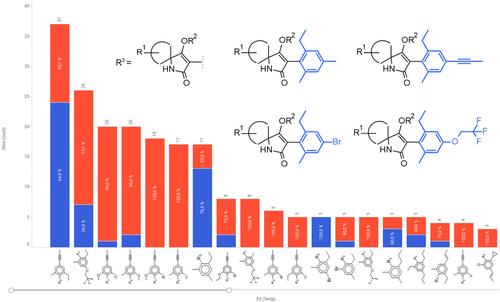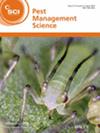Investigation of acetyl-CoA carboxylase-inhibiting herbicides that exhibit soybean crop selectivity
IF 3.8
1区 农林科学
Q1 AGRONOMY
引用次数: 0
Abstract
The sustainable control of weed populations, particularly resistant species, is a significant challenge in agriculture around the world. The α-aryl-keto-enol (aryl-KTE) class of acetyl-CoA carboxylase (ACCase)-inhibiting herbicides represent a possible solution for the control of resistant grasses even though achieving crop selectivity remains a challenge. Herein, we present some of our investigations into identifying the most promising structural features within the aryl-KTE class that give the highest chance of achieving soybean crop selectivity, whilst also maintaining strong and broad efficacy against problematic weed species. We further examined our results by preparing new aryl-KTE molecules which were evaluated in glasshouse screening assays for their herbicidal efficacy as well as their soybean selectivity. We consider that uniting this approach with other optimization criteria, such as toxicological and environmental safety profiles, will enable the streamlining of crop protection optimizations programmes, ultimately delivering safer and more sustainable solutions to farmers and consumers. © 2024 The Author(s). Pest Management Science published by John Wiley & Sons Ltd on behalf of Society of Chemical Industry.

研究具有大豆作物选择性的乙酰-CoA 羧化酶抑制除草剂
如何持续控制杂草种群,尤其是抗性杂草种群,是全球农业面临的一项重大挑战。α-芳基酮烯醇(芳基-KTE)类乙酰-CoA 羧化酶(ACCase)抑制性除草剂是控制抗性禾本科杂草的可能解决方案,尽管实现作物选择性仍是一项挑战。在此,我们介绍了我们为确定芳基-KTE 类除草剂中最有前景的结构特征所做的一些研究,这些特征最有可能实现对大豆作物的选择性,同时还能对问题杂草物种保持强大而广泛的药效。我们制备了新的芳基-KTE 分子,并在温室筛选试验中评估了这些分子的除草效果和对大豆的选择性,从而进一步检验了我们的研究成果。我们认为,将这种方法与其他优化标准(如毒理学和环境安全概况)相结合,将有助于简化作物保护优化计划,最终为农民和消费者提供更安全、更可持续的解决方案。© 2024 作者简介害虫管理科学》由约翰威利和桑斯有限公司代表化学工业协会出版。
本文章由计算机程序翻译,如有差异,请以英文原文为准。
求助全文
约1分钟内获得全文
求助全文
来源期刊

Pest Management Science
农林科学-昆虫学
CiteScore
7.90
自引率
9.80%
发文量
553
审稿时长
4.8 months
期刊介绍:
Pest Management Science is the international journal of research and development in crop protection and pest control. Since its launch in 1970, the journal has become the premier forum for papers on the discovery, application, and impact on the environment of products and strategies designed for pest management.
Published for SCI by John Wiley & Sons Ltd.
 求助内容:
求助内容: 应助结果提醒方式:
应助结果提醒方式:


